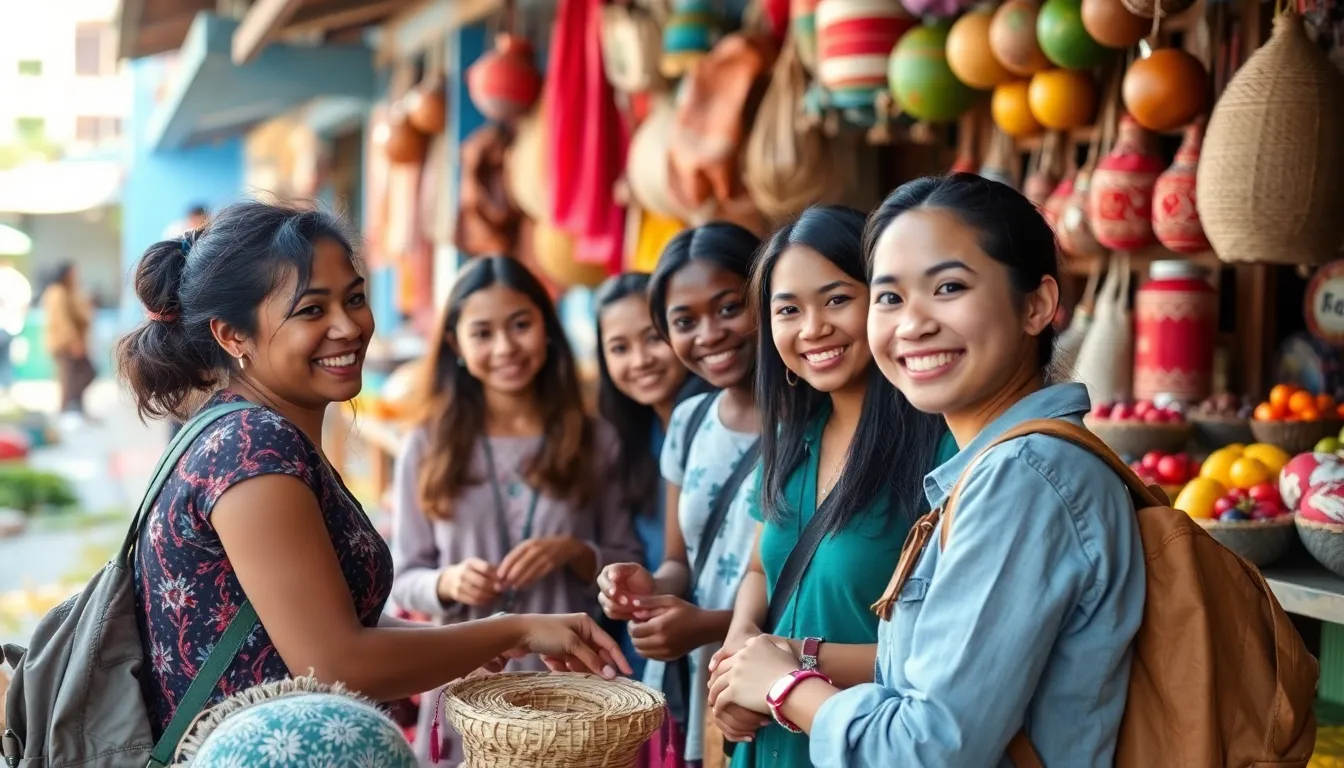Table of Contents
ToggleImagine swapping your classroom for the vibrant streets of Paris or the ancient ruins of Rome. Educational travel opportunities offer a passport to adventure and a chance to learn in ways textbooks can’t match. It’s not just about collecting stamps in your passport; it’s about immersing yourself in new cultures, languages, and experiences that broaden horizons and spark curiosity.
Overview of Educational Travel Opportunities
Educational travel opportunities encompass a range of experiences tailored to enhance learning. Programs designed for students often include study abroad initiatives, which allow participants to immerse themselves in foreign cultures while pursuing academic goals. Many institutions partner with global organizations to facilitate internships that combine professional skills with cultural exposure.
Field trips serve as another avenue for educational travel. Organized excursions to historical sites, museums, and natural landmarks offer firsthand learning experiences. Participants engage directly with local experts, fostering deeper understanding and critical thinking.
Cultural exchange programs provide unique opportunities for participants to live and learn within diverse communities. These programs promote language acquisition and social awareness. Students often return with enhanced global perspectives and personal growth.
Nonprofits and educational travel companies create specialized trips focused on topics such as environmental science, history, and art. These journeys include guided tours led by experts, ensuring that travelers gain comprehensive insights into the subjects studied.
Adventure-based learning also falls under educational travel. Programs emphasize teamwork and problem-solving through outdoor activities like rock climbing, hiking, and community projects. Participants develop practical skills while navigating real-world challenges.
Travel scholarship opportunities further broaden access to educational experiences. Institutions often offer financial aid for students to participate in these programs, promoting inclusivity and diverse representation.
Overall, the myriad educational travel options available enrich learners’ experiences and facilitate transformative personal journeys.
Benefits of Educational Travel

Educational travel offers various advantages, promoting growth through immersive experiences. By stepping outside familiar environments, individuals gain unique insights and develop essential skills.
Personal Development
Traveling fosters personal growth. Immersive experiences challenge comfort zones, nurturing resilience. Individuals learn to adapt and overcome obstacles, which enhances problem-solving skills. Increased independence often accompanies travel, empowering them to navigate unfamiliar locations. Networking opportunities arise through interactions with peers and locals, broadening social circles. Learning new skills, from language acquisition to teamwork, supports overall development. Educational travel often leads to increased confidence as individuals tackle real-world situations.
Cultural Awareness
Experiencing different cultures enhances understanding. Exposure to diverse traditions and perspectives fosters empathy and appreciation for diversity. Students learn about global issues firsthand, which promotes informed citizenship. Through cultural exchanges, individuals engage in meaningful dialogues, breaking down stereotypes. Learning about local customs and practices allows for deeper connections, enriching personal experiences. Immersive environments encourage language practice, facilitating communication. Ultimately, gaining cultural awareness leads to a more informed worldview, enhancing interpersonal relationships and community involvement.
Types of Educational Travel Programs
Educational travel includes various formats that enhance learning experiences. Each type offers unique opportunities for personal growth and academic achievement.
Group Tours
Group tours provide structured environments for learning. Participants explore destinations guided by knowledgeable instructors. Programs often include cultural activities, historical site visits, and interactive workshops. Educational focus varies, ranging from language immersion to history. These tours promote camaraderie through shared experiences and collaboration among participants.
Volunteer Programs
Volunteer programs enable participants to engage in meaningful community service abroad. Travelers contribute their skills while gaining insights into local cultures. These programs include conservation efforts, teaching opportunities, and health initiatives. Participants often report increased empathy and social awareness after their experiences. Impactful work creates a connection between volunteers and communities, enriching learning beyond traditional methods.
Study Abroad
Study abroad programs immerse students in foreign academic environments. Participants attend local institutions while experiencing different cultures firsthand. Programs may range from semester-long exchanges to summer courses focused on specific subjects. Language skills often improve as students communicate in diverse settings. Academic achievements align with cultural exploration, enhancing understanding of global perspectives.
Key Destinations for Educational Travel
Exploring key destinations enhances learning and broadens perspectives. Each region offers unique experiences that nourish curiosity and cultural understanding.
Europe
Europe stands as a treasure trove of educational opportunities. Cities like Rome and Athens teem with ancient history, ideal for students of archaeology and history. Art enthusiasts benefit from visits to museums in Paris and Madrid, home to masterpieces by renowned artists. Language immersion programs in countries like Spain, France, and Germany promote fluency while enjoying local culture. Educational tours often include workshops that involve local experts, fostering deeper comprehension of regional heritage.
Asia
Asia offers diverse educational experiences, ranging from technological advancements in Japan to the rich traditions of India. Students can explore the modernity of South Korea through interactive programs focused on innovation. Cultural exchanges in China provide insights into language and customs, enhancing students’ global perspectives. Historical sites, such as the Great Wall or the Taj Mahal, serve as living classrooms, blending history and architecture. Field trips to local markets allow for experiential learning about economics and trade practices.
South America
South America showcases vibrant cultures and ecosystems that enrich educational travel. The Amazon rainforest, a hub for environmental science, offers immersive experiences in biodiversity and conservation. Archaeological sites like Machu Picchu invite exploration of Incan history and culture. Language schools in countries such as Argentina and Brazil provide students with intensive learning opportunities while engaging with locals. Programs focused on social issues, like poverty and education, encourage awareness and critical thinking about global challenges.
Tips for Planning Educational Travel
Planning educational travel involves careful consideration to maximize both learning and enjoyment. Prioritizing specific goals sets the foundation for an effective travel experience.
Budgeting
Establishing a budget is crucial for any travel experience. Start by determining overall costs, including transportation, accommodations, meals, and activities. Research available scholarships that may reduce expenses. Consider group discounts, which can lower costs for educational excursions. Keeping an eye on seasonal prices helps identify potential savings throughout the year. Allocate funds for unexpected expenses, such as emergencies or additional activities. Tracking all expenses during the trip ensures adherence to the budget.
Safety Considerations
Addressing safety is essential for any traveler. Research the destination to understand local customs and laws. Familiarize with the nearest medical facilities, as well as emergency contacts in the area. Register with local authorities if traveling abroad for an extended period. Equip participants with essential safety tips, like staying in groups and keeping valuables secure. Carry copies of important documents, such as passports and travel itineraries, to safeguard against loss. Understanding cultural sensitivity can also prevent misunderstandings and promote positive interactions.
Educational travel opens doors to transformative experiences that extend beyond the classroom. It cultivates curiosity and fosters personal growth through immersion in diverse cultures and environments. The opportunities available—from study abroad programs to volunteer initiatives—encourage individuals to develop critical skills and broaden their perspectives.
By stepping outside their comfort zones, travelers not only gain knowledge but also build resilience and empathy. The journey of educational travel ultimately enriches lives, creating informed global citizens who appreciate the world’s diversity. Embracing these experiences can lead to a deeper understanding of both oneself and the interconnectedness of humanity.


